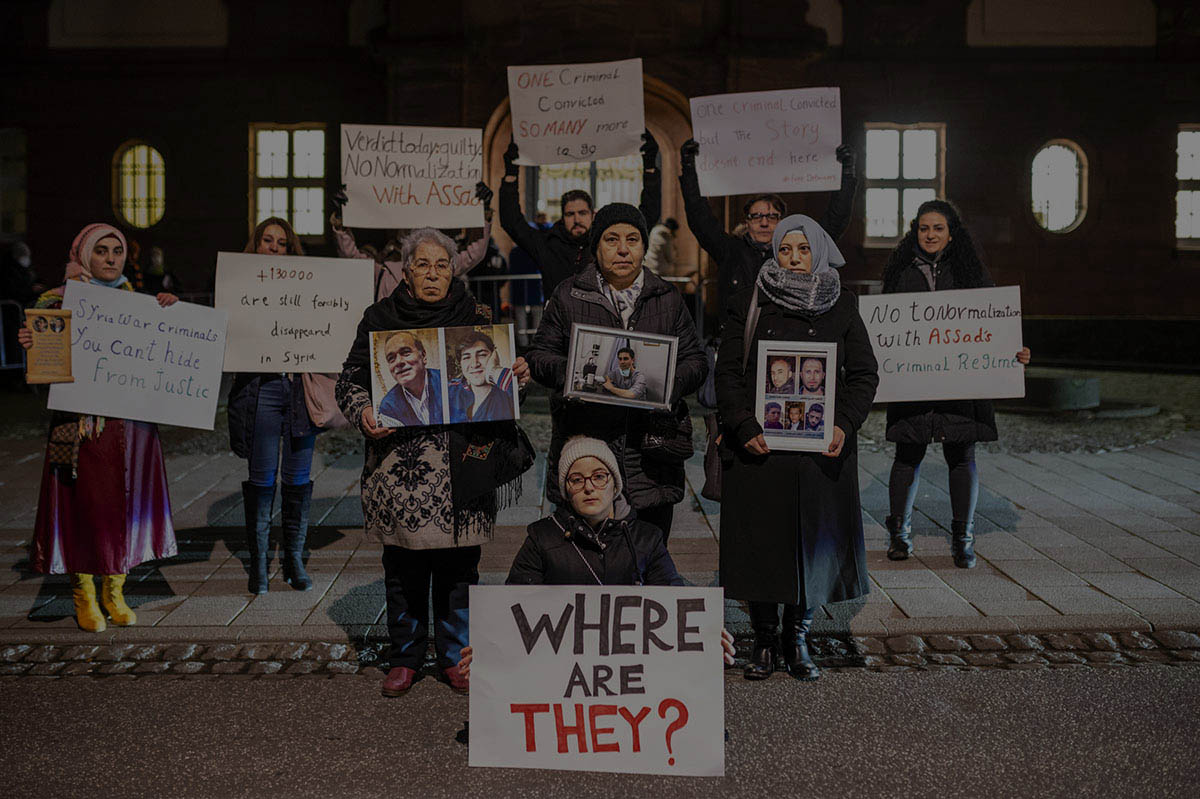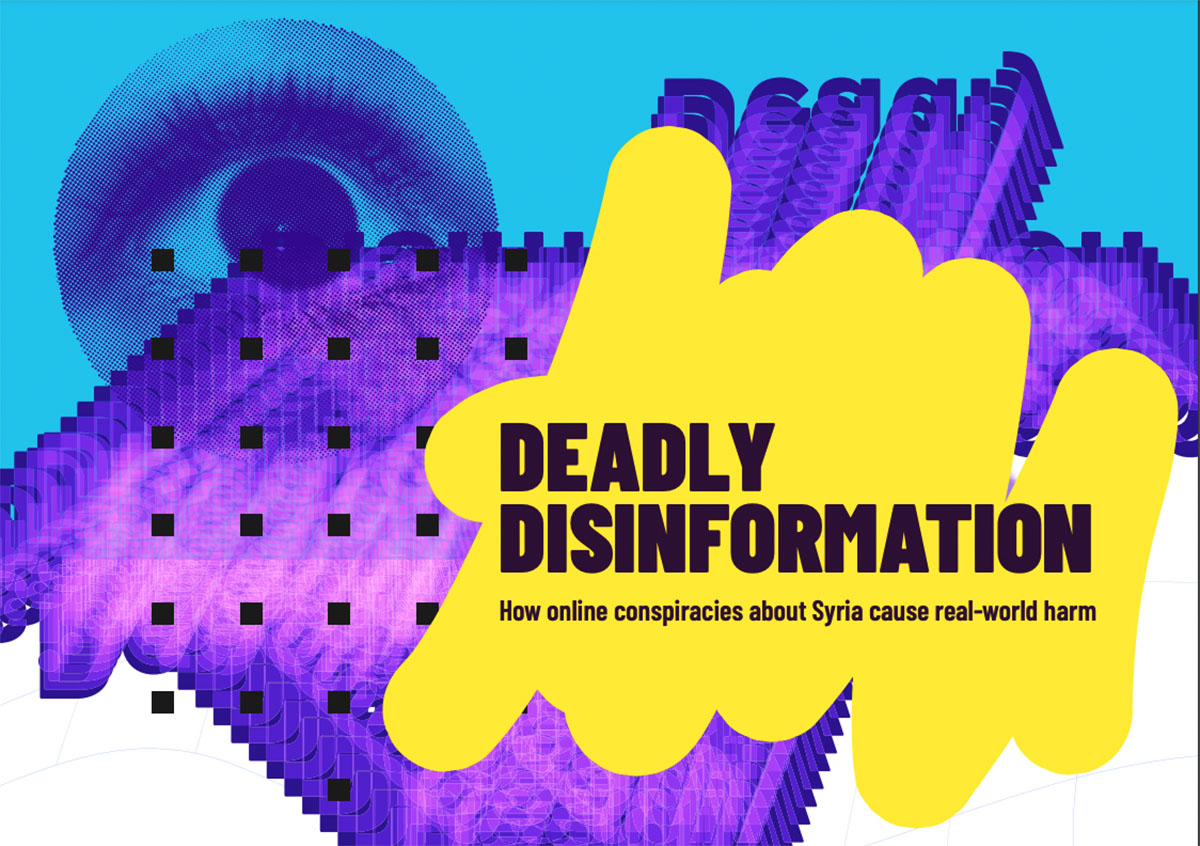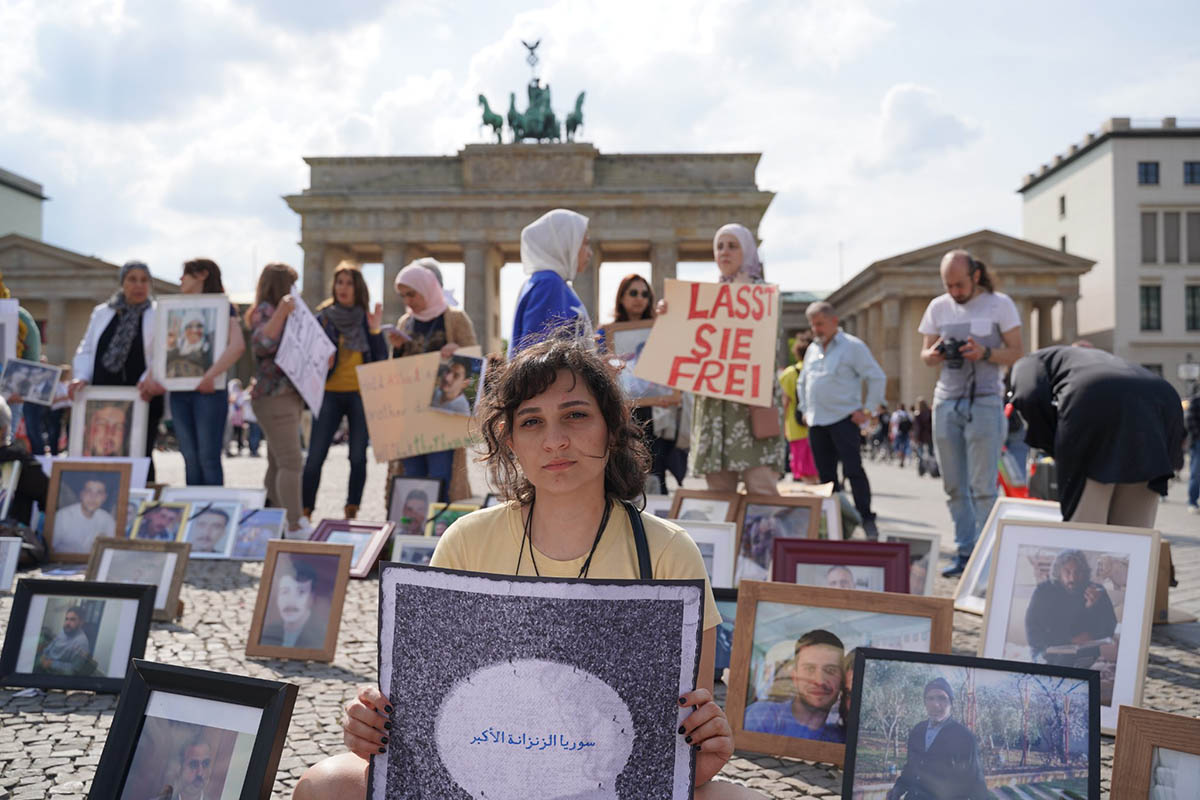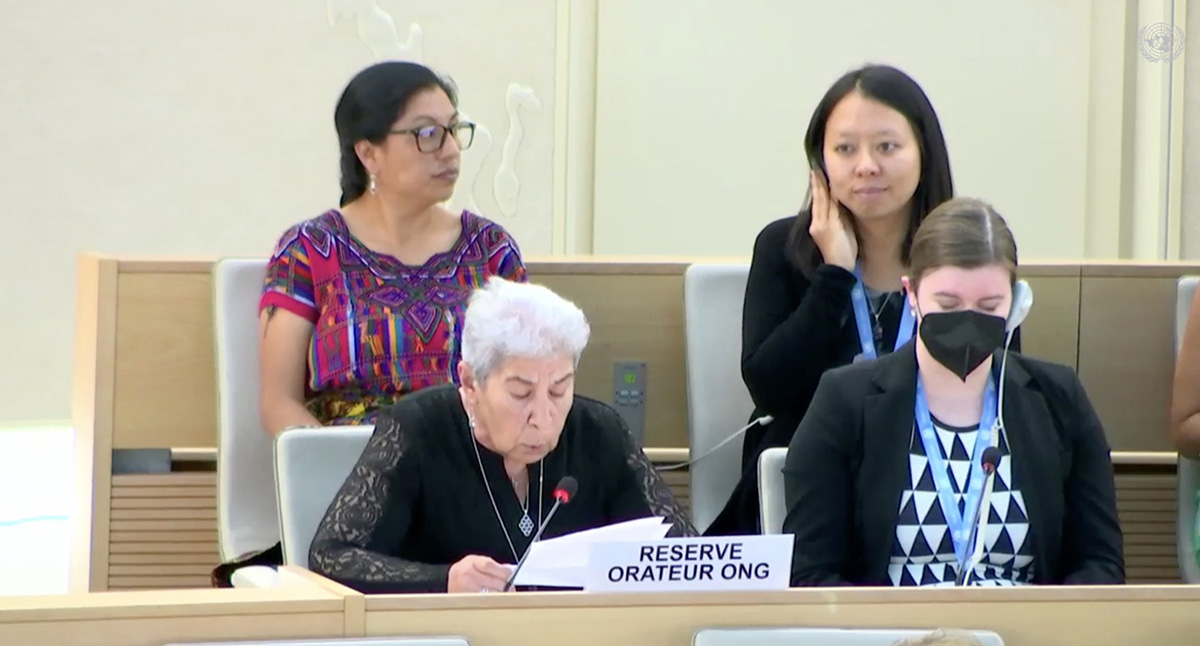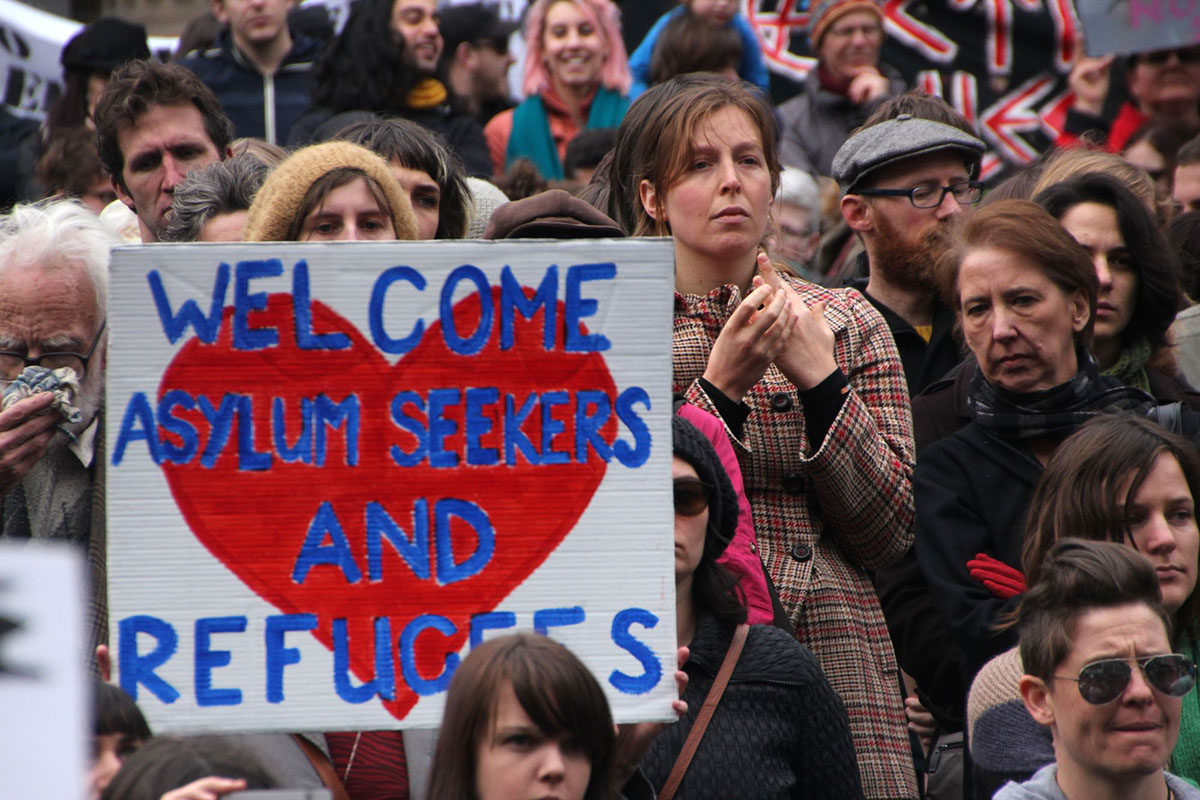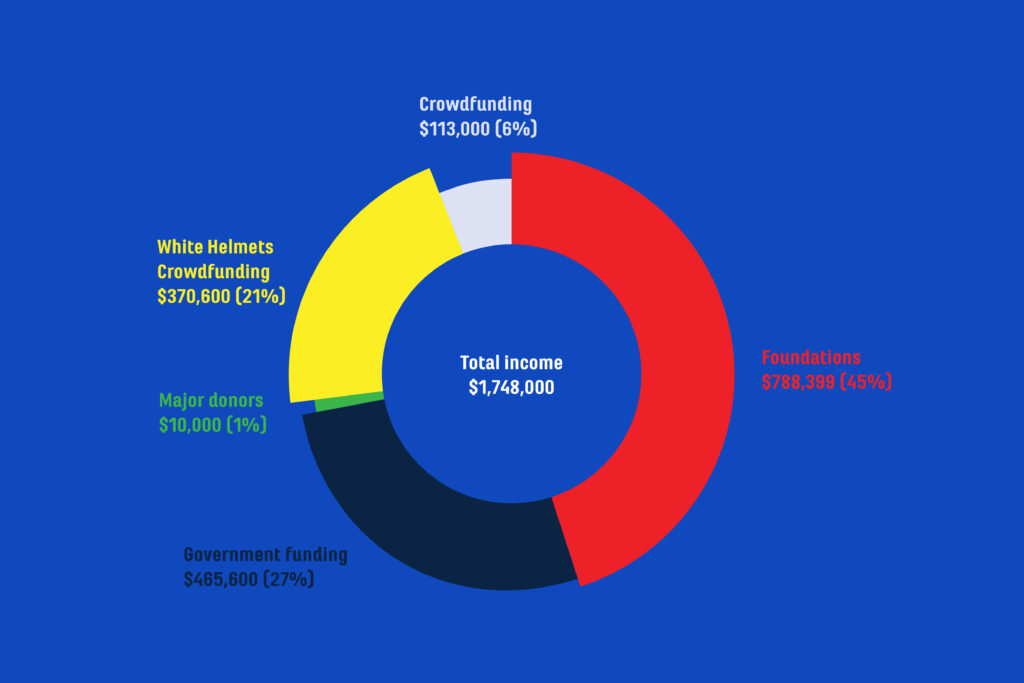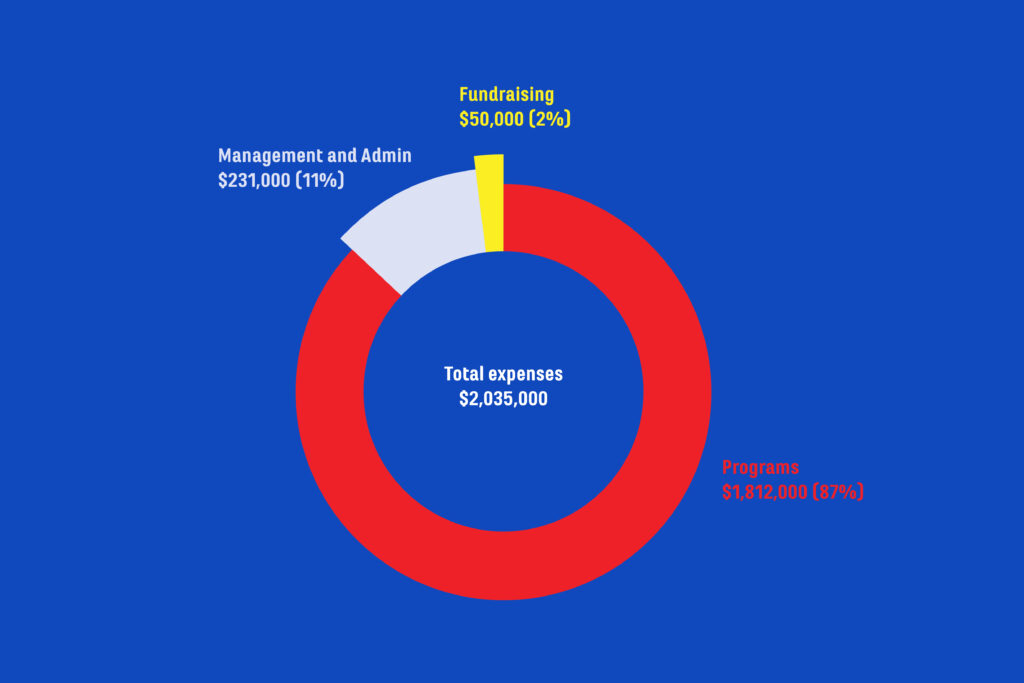Letter from our Executive Director
2022 was a year when many Syrians found themselves reliving the darkest horrors of the Syrian war as Putin’s brutal invasion of Ukraine brought familiar scenes of bombed out civilian homes and refugees fleeing in terror back to our TV screens. It was a painful reminder of the heavy cost of failing to hold Putin to account for the atrocities Russia and the Syrian regime have perpetrated against civilians in Syria for more than a decade with total impunity.
But amid the darkness it was also a year that brought glimmers of hope and where the bravery and tireless advocacy efforts of Syrian activists in recent years began to pay off. At the start of the year, our partners in victim and family groups stood outside a courtroom in Koblenz to hear the first conviction of a senior official in Assad’s regime for crimes against humanity.
I am also proud to say that the relentless campaigning of our partners played an instrumental role in getting the UN Secretary General to recommend setting up an international body to uncover the fate and whereabouts of ten of thousands of people who remain forcibly disappeared in Syria.
Even before the devastating earthquake of early 2023, the humanitarian needs in Syria were greater than ever. Across the country from areas under regime control to the rest of the country the impact of an economic crisis has been keenly felt.
At the same time, Syrians have faced a horrifying wave of hate crimes and discrimination whether in neighbouring countries such as Türkiye or Lebanon or even in Western democracies where refugees continue to encounter inhumane immigration policies and widespread hostility.
In 2023 we are facing the growing challenge of normalization of the Assad regime as the world looks on in silence. We and our partners are committed to doing everything we can to keep shining a spotlight on the Assad regime’s past and ongoing abuses to combat this dangerous shift towards normalization and stop the regime from rewriting history or whitewashing their crimes.
Yours sincerely,
Laila Kiki, Executive Director
2022 in numbers – Syria
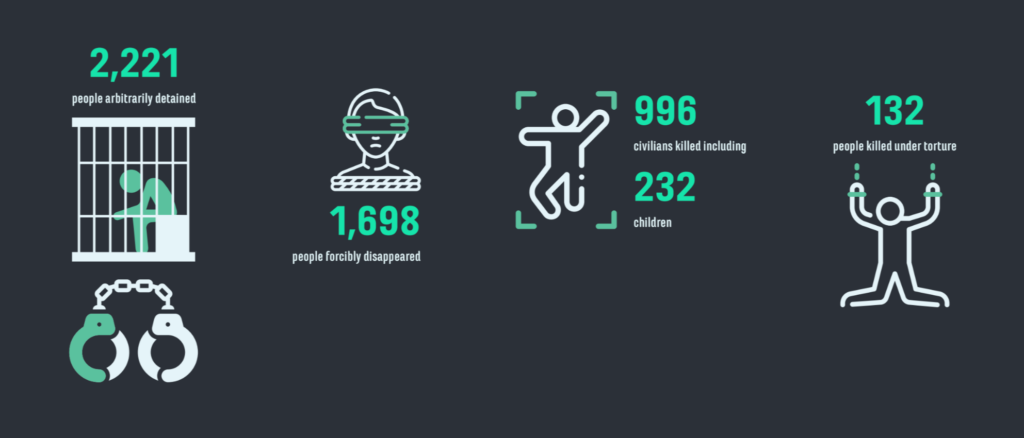
Source: Syrian Network for Human Rights
2022 in numbers – The Syria Campaign
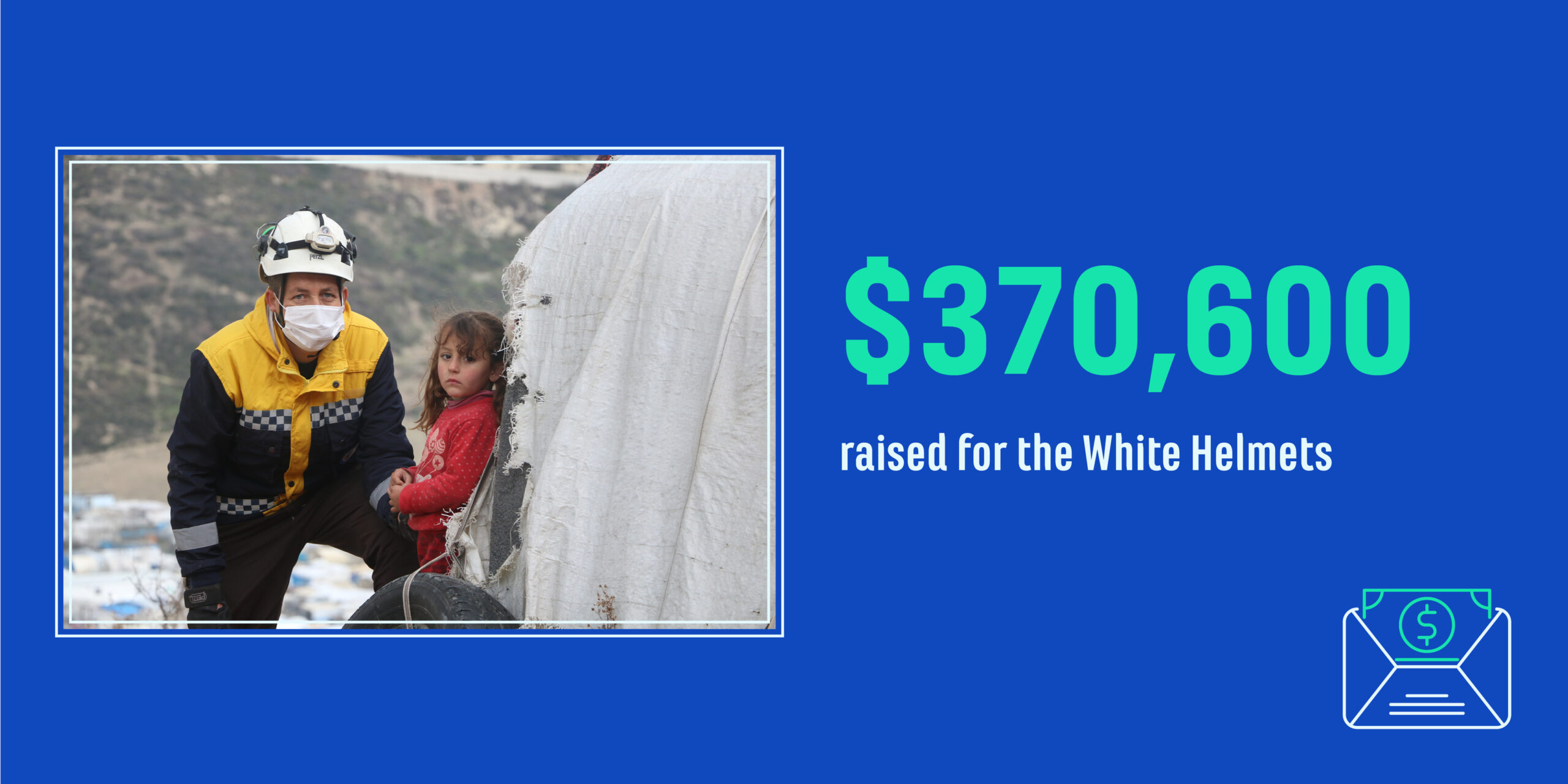

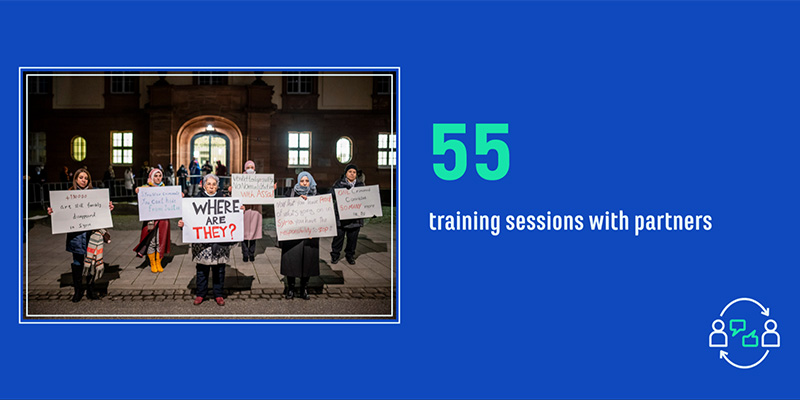
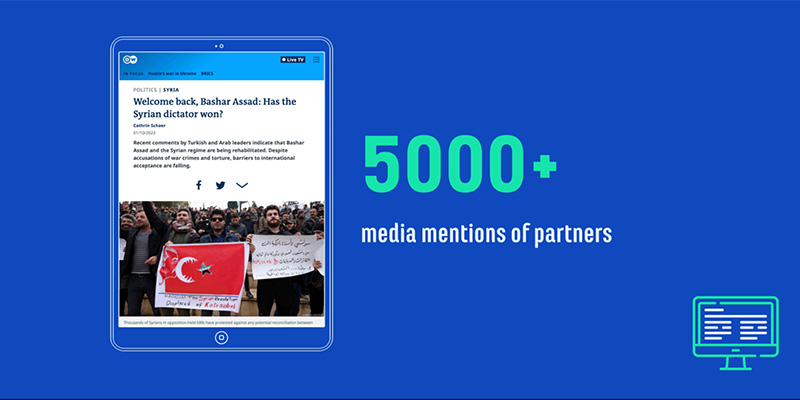
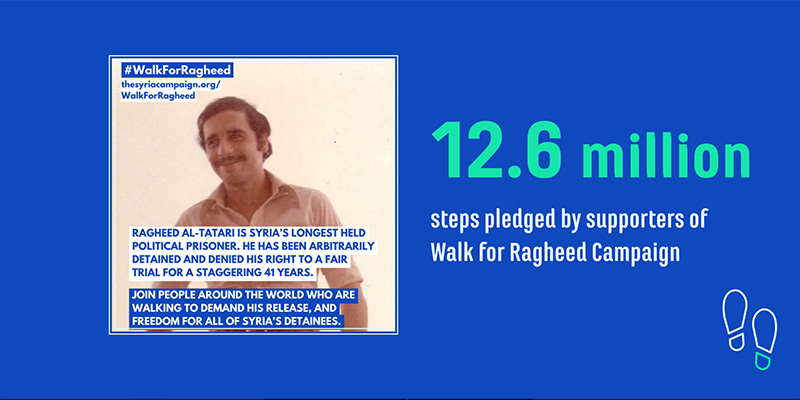
Deadly disinformation
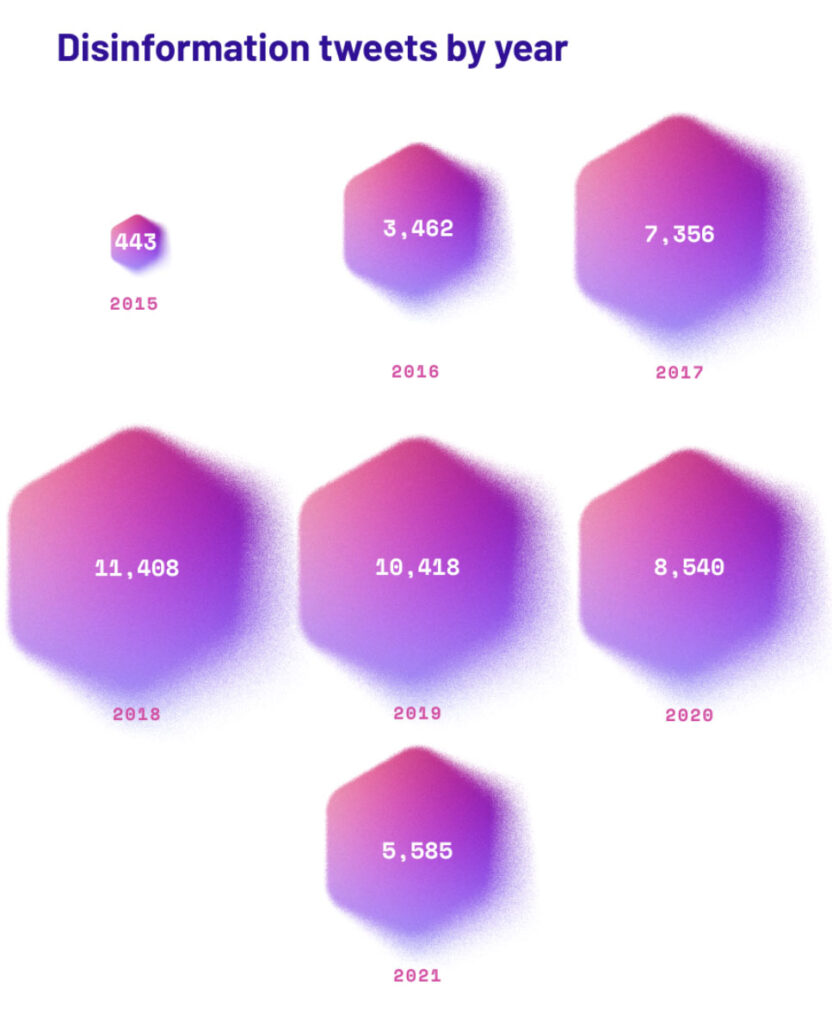
In recent years online disinformation has permeated our lives – whether through campaigns to influence elections, aiding the spread of Covid-19 conspiracies or making false claims about the war in Ukraine. Ever since Syrians took to the streets in 2011, the Syrian regime has used disinformation as a tool to silence opponents and cover up war crimes. Peaceful protesters and first responders including The White Helmets, have been repeatedly subjected to state-backed disinformation campaigns. In June 2022 we released a new report Deadly Disinformation: How online conspiracies about Syria cause real-world harm to expose the ongoing impact of online disinformation on real-world events and people’s lives. Working with the Institute for Strategic Dialogue (ISD), the report reveals how human rights defenders, victims of war crimes, journalists and humanitarians on the frontlines in Syria have endured seven years of harassment and hate-filled disinformation attacks.
The report featured in exclusive coverage by the Observer newspaper in English and Al Jumhuriya in Arabic. It highlighted how the failure by governments and social media platforms to stop lies spreading online about the Syrian conflict has had devastating real-world consequences. The report identifies 10 key impacts in the real world, and urges governments and social media platforms to take urgent action to stop disinformation over Syria.
Hamid Kutini, White Helmets volunteer, from northwest Syria who was a first responder and eyewitness to the Khan Sheikhoun chemical attack of 2017 became the target of online disinformation by the Syrian regime and Russia. The White Helmets centre in the area was attacked soon afterwards. He said his daily life continues to be impacted by disinformation.
“I live in constant fear of going home and never seeing my family or hearing their voices again. I am committed to saving lives, and they are targeting us for that.”
Hamid Kutini, White Helmets volunteer
Our research examined tens of thousands of tweets between 2015 and 2021, and interviewed people targeted by disinformation, policy-makers and policy experts to piece together a timeline of disinformation over Syria and illustrate its impact on political decision-making over Syria.
The report identified 47,000 tweets and 817 Facebook posts from accounts of 28 individuals, outlets and organizations who have spread disinformation about the Syrian conflict between January 2015 and December 2021. This content was shared directly with an audience of 3 million. Retweets of this content took its false messages even further.
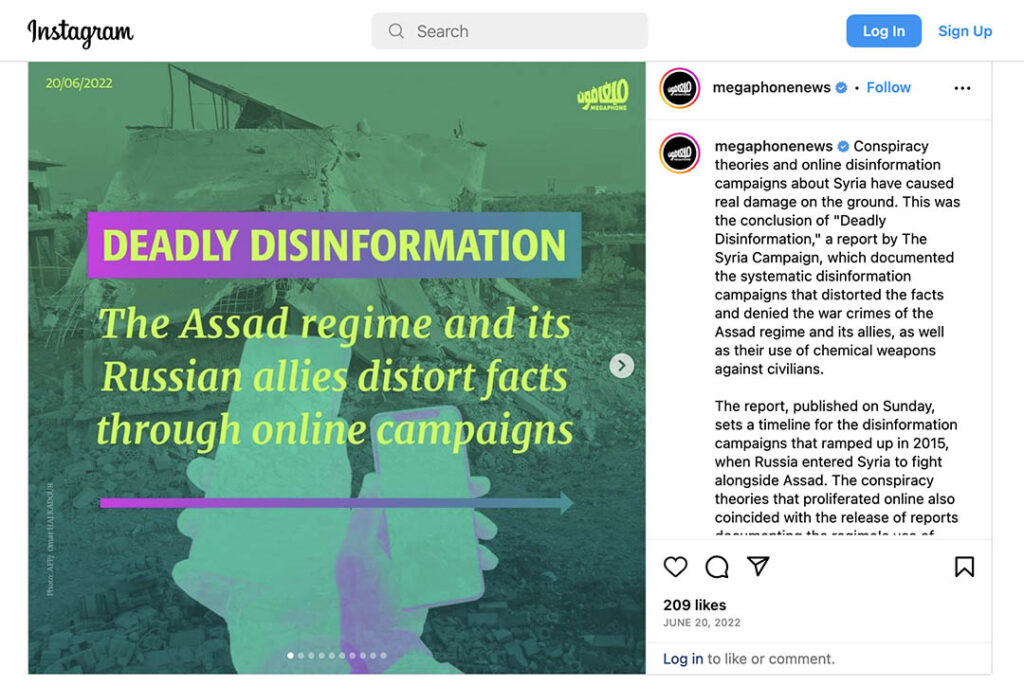
More than 8,900 people signed our petition to demand that social media companies act now to address disinformation and help preserve the truth and memories of war crimes.
The report’s findings formed the basis of a Rights Con session Why disinformation matters: the real-world impact on human rights defenders facilitated by the Institute of Strategic Dialogue and included speakers from Action for Sama, The White Helmets, Women Now for Development and a BBC journalist.
This is, by far, one of the most comprehensive and excellent research pieces on online conspiracies and disinformation that plagued and haunted Syrians since the revolution of 2011. Massive shout out to @TheSyriaCmpgn for this rigorous effort.https://t.co/2DnLlkAxTg
— Marwa Fatafta مروة فطافطة (@marwasf) June 22, 2022
I’d also add in terms of impact that this campaign has attempted to undermine some of the best evidence of atrocities in Syria, as well as to enable the direct targeting and killing of first responders and those who collect this evidence.https://t.co/FVprcE7PIg
— Nick Waters (@N_Waters89) June 19, 2022
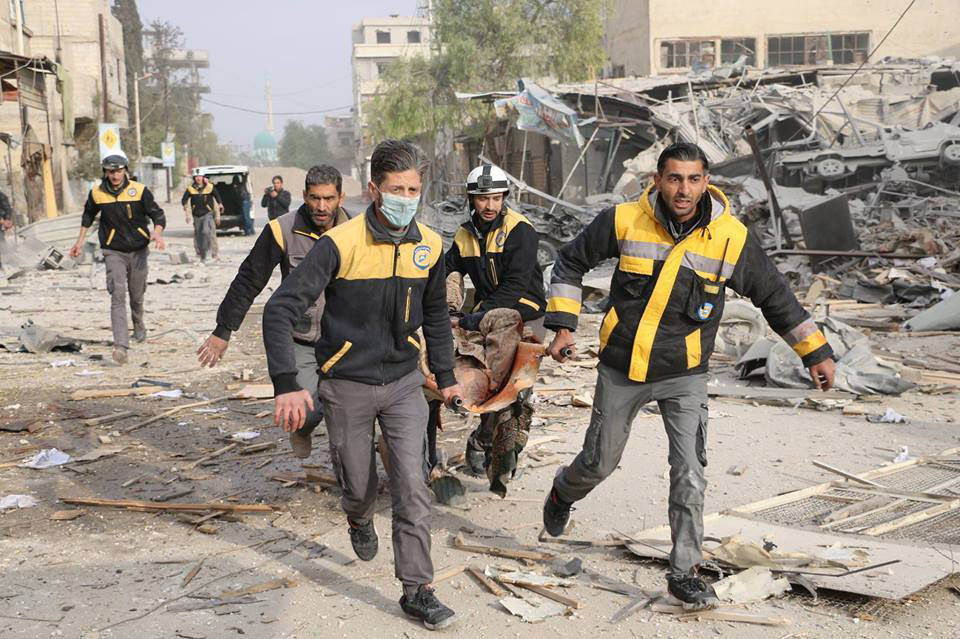
Spotlight on detention in Syria
The Syrian regime continues to subject people to arbitrary detention and enforced disappearance in Syria shattering lives and causing endless suffering. According to the Syrian Network of Human Rights (SNHR), at least 112,000 people remain forcibly disappeared in Syria including 3,041 children. More than 85% have been forcibly disappeared at the hands of the Syrian regime.
By elevating the voices and demands of victim-led groups, we continually strive to make the scale of detention and enforced disappearance in Syria known globally, increasing the pressure on the UN and the international community to reveal the fate of Syria’s disappeared, release detainees, and bring justice.
In March 2022 we launched the Syria Waits website, a photography project featuring powerful portraits and stories of the Syrian families living in limbo as they wait for any news or answers about the fate of their forcibly disappeared loved ones. Creating this site is part of our efforts to preserve and amplify the families’ narrative to ensure their stories are heard. It serves as a reminder that the search for Syria’s disappeared is ongoing and the agony and suffering that these families endure does not diminish even as the years continue to go by. A powerful photo essay “Waiting for the phone call” was also published in Tortoise Magazine featuring interviews and photographs of family members waiting to hear any news of their disappeared loved ones.
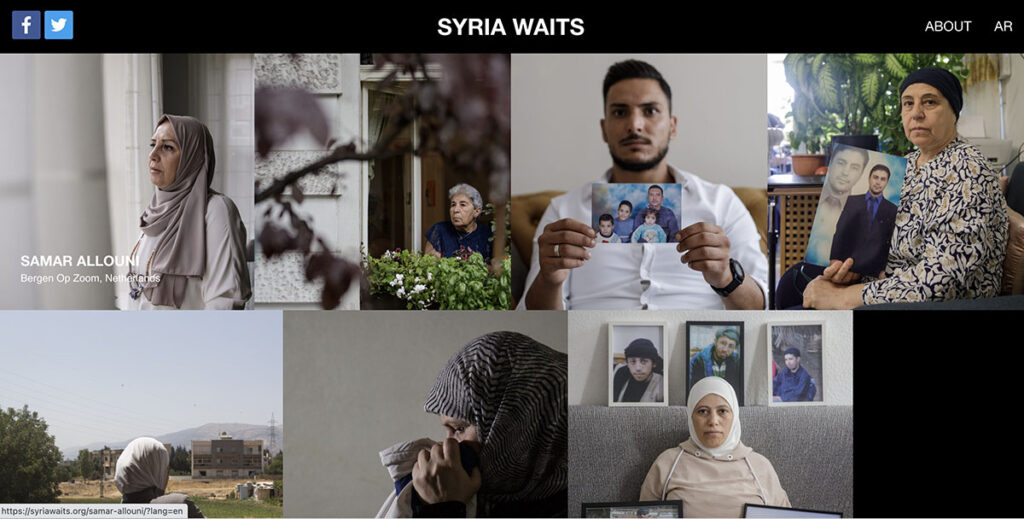
Throughout the year we also held 24 capacity building sessions with partners including the Association of Detainees and the Missing at Sendaya Prison , Families for Freedom, Caesar Families Association, Caesar Files Group, Synergy to enhance their advocacy, storytelling and media skills.
One of our key partners for the year was the Association of Detainees and the Missing at Sendaya Prison (ADMSP) an organization co-founded by former survivors of detention that is doing incredible work both to document atrocities that have been committed in detention facilities across Syria, including the notorious Sednaya military prison, as well as providing valuable support to families of the detained and disappeared as well as former detainees who have been released.
In April 2022 we partnered with ADMSP to promote new research findings revealing that the Assad regime has confiscated up to $1.5 billion worth of assets from Syrian detainees since the revolution first began in 2011. We supported ADMSP by providing advice and input into media messaging, producing supportive media materials and the shaping of the narrative of report, ‘They took everything’: Confiscation of detainees’ assets and funds in Syria encouraging them to highlight the human impact of this practice on the daily lives of detainees affected. We also pitched the report to the Guardian newspaper which published an exclusive featuring the report.
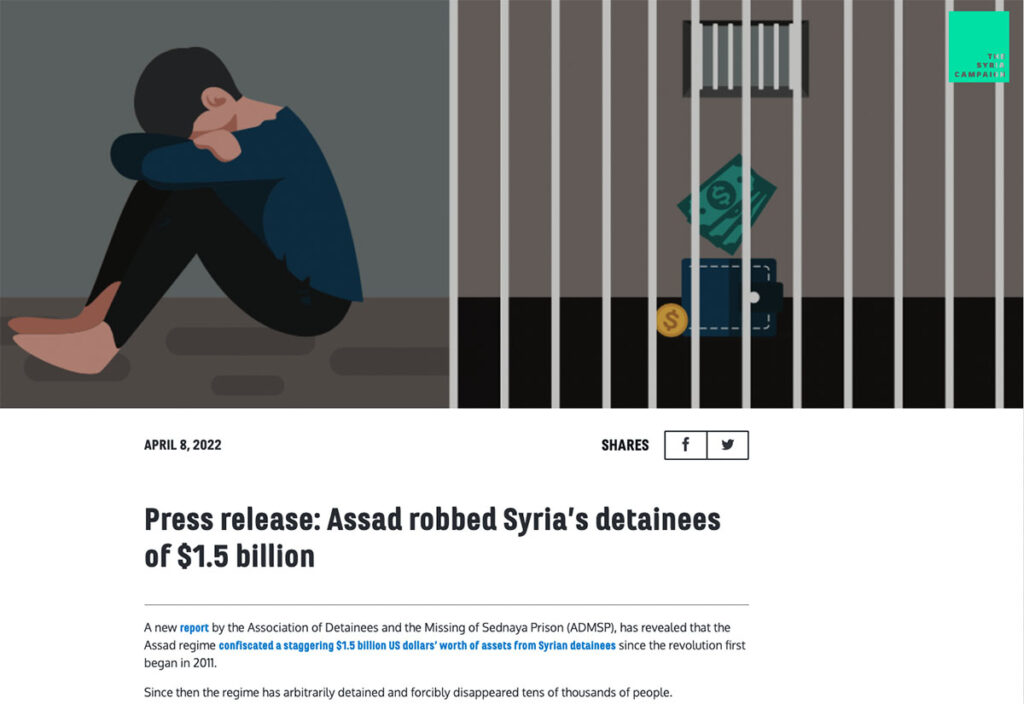
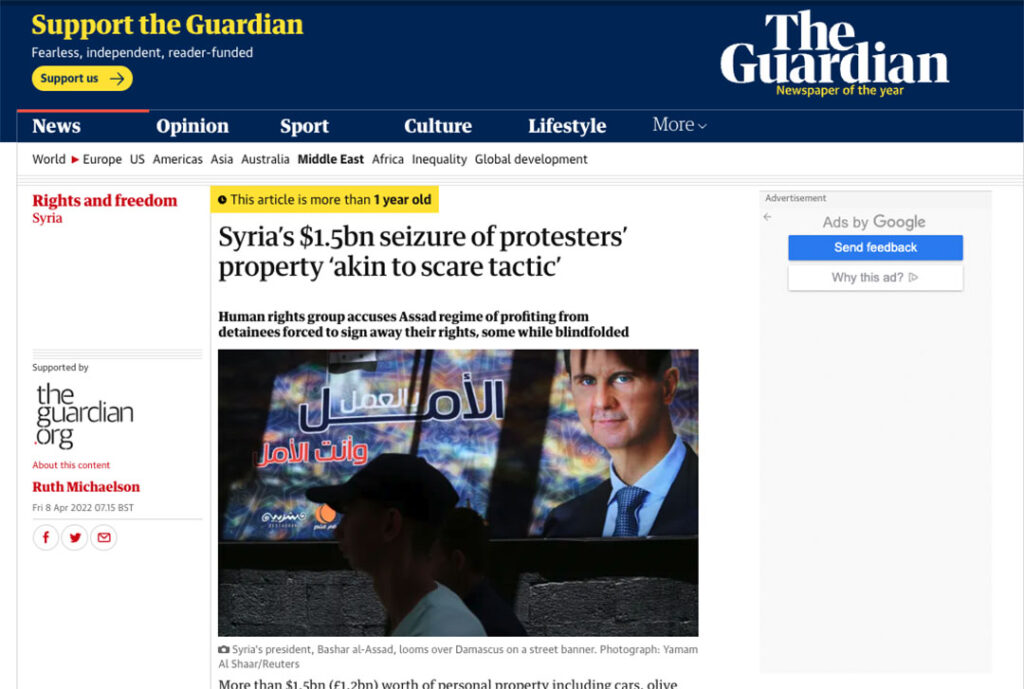
Later in the year the findings of the report were the focus of a joint event with the Simon-Skjodt Center for the Prevention of Genocide at the US Holocaust Memorial Museum that was attended by high level representatives of think tanks, governments, and US congress staff.
This was the first of two hard-hitting reports published by ADMSP in 2022 which TSC provided comms and campaigning support for. In October 2022 a new report provided a comprehensive overview of the inner workings and hierarchical structure of the Syrian regime’s most notorious detention facility, Sednaya Military Prison. The report detailed the prison’s chain of command for the first time, revealing those responsible for ordering and committing widespread and systematic torture and killings of detainees at Sednaya amounting to crimes against humanity. It also revealed harrowing new details including how special “salt chambers” were created at the prison to store dead bodies of prisoners killed in mass secret executions at the prison. Our supporters in the UK emailed their MPs to demand they use the information revealed in this report to pursue war crimes trials and demand accountability for Syrian and Russian crimes.
Behind the Sun Podcast
To this day the Assad regime continues to deploy arbitrary detention as a tool to silence dissent and terrorize civilians. As part of our work to illustrate the vast and systematic nature of detention in Syria, in April 2022 we released a podcast Behind The Sun offering a behind-the-scenes insight into the hidden network of Syria’s infamous detention centres. The podcast aimed to shed light on the vital work being done by The Association of Detainees and The Missing in Sednaya Prison (ADSMP), run by survivors of detention, to ensure justice and freedom for the tens of thousands of those who remain detained or missing in Syria today. In a six-part narrative listeners hear the stories of detainees who have endured years of detention and forced disappearance, surviving against the odds, as well as those of families who have spent years agonizingly searching for their missing loved ones.
The podcast is hosted by Nadia Albukai, a 20-year-old Syrian woman who fled her country with her family six years ago, out of fear for her father’s, a well known Syria painter, persecution, after he was detained twice for his social activism. Behind the Sun exposes the ongoing horrors that more than 100,000 detainees in Syria and their families continue to face in prisons like Sednaya, Syria’s most notorious detention camp.
Behind the Sun was listed at the top of Spotify’s browse page and featured in the Apple UK podcast section. Over 12,000 people downloaded our podcast within the first six weeks, it was featured as one of The Guardian’s “best podcasts of the week”.
Riyad Avlar, one of the main characters in the podcast, described the experience of recording the podcast and sharing their experience as “a form of healing”.
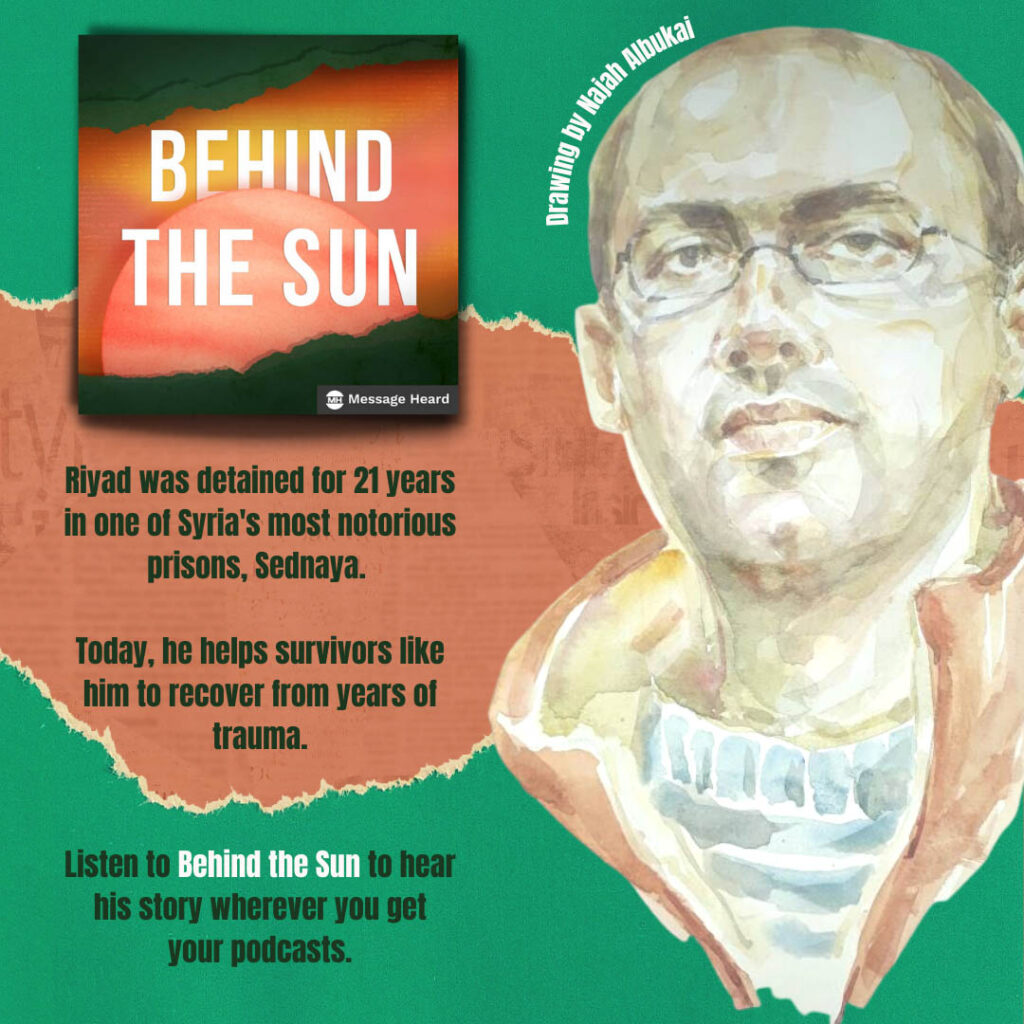
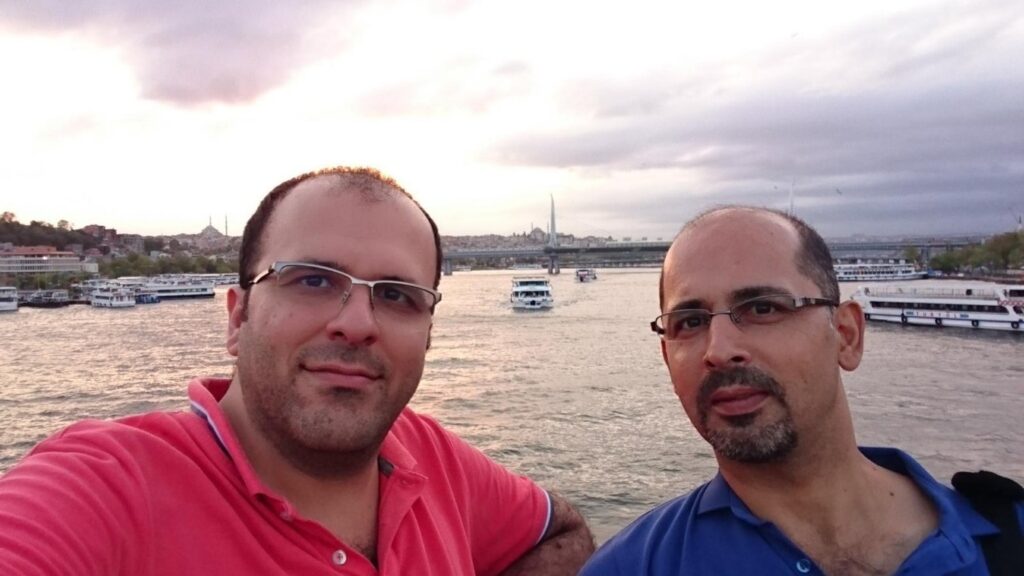
“When we were under the cruelest conditions in detention, when they were torturing us, the thing that kept us withstanding and resisting was when we’d think ‘it’s ok, hang in there, one day you’ll get out of this place and you’ll tell your story to the world so they hear you, they hear what happened to you. And people will hear it and will sympathize with your wounds. This sympathy is what will heal your wounds.”
Riyad Avlar, co-founder of ADMSP

UN institution for Syria’s disappeared
Since 2021, The Syria Campaign has supported the demand of family-led groups to establish an international institution to clarify the fate and whereabouts of their missing loved ones. In August 2022, the UN Secretary General published a report recommending “the creation of a new institution dedicated to clarifying the fate and whereabouts of persons reasonably believed to be missing in the Syrian Arab Republic and to providing adequate support to victims, survivors and the families of those missing”.
The recommendation was a triumph for victim and family groups of Syria’s disappeared who have been tirelessly campaigning for justice and demanding answers over the past decade. The UN Secretary General’s report is a step further in the creation of an international mechanism to establish the fate and whereabouts of the disappeared, a key demand of the Truth and Justice Charter launched in February 2021.
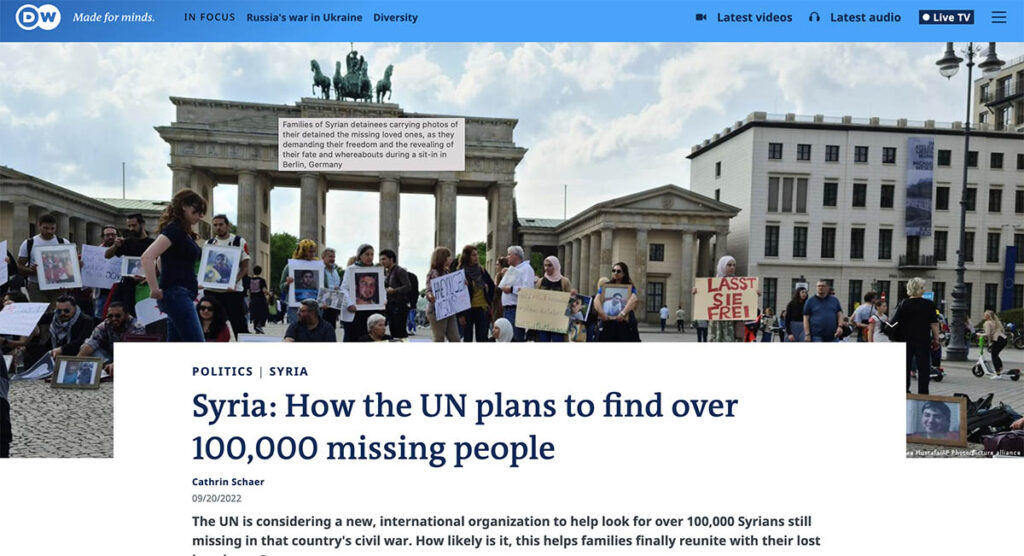
The Syria Campaign supported the advocacy efforts of the Truth and Justice Charter to ensure the establishment of this mechanism, emphasizing the central role of families and victims in its work. In November, we provided support for a delegation of family members to meet with several UN missions and participate in a high-level panel held in New York. During the panel, family members had the opportunity to engage with UN officials, government representatives, and experts, discussing the next steps required to translate the Secretary-General’s recommendations into concrete measures. We also arranged media interviews with Fadwa Mahmoud from Families for Freedom with the Irish Times and Deutsche Welle to talk about why establishing such a mechanism is so important to families of the disappeared.
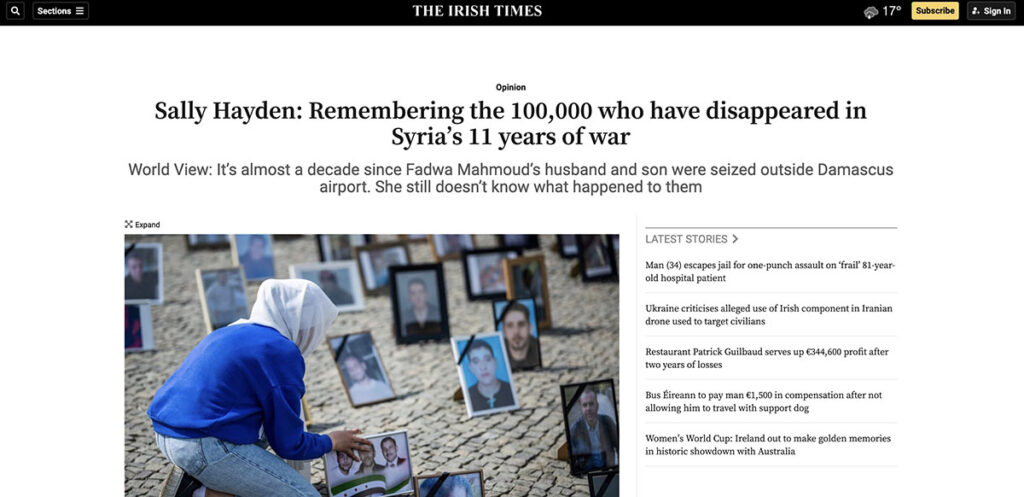

“We’ve been waiting a long time for this, but it’s just the first step, now we need to see the UN turn these words into action by establishing the mechanism placing the demands of victim groups and detainees’ and missing persons’ families at the center – because we refuse to be on the margins anymore.”
Fadwa Mahmoud, co-founder of Families for Freedom
The struggle for justice: Koblenz trial
On 13 January 2022 in a small courtroom in Koblenz, a city in western Germany, a former colonel in the Syrian regime was convicted for crimes against humanity for the first time. Anwar Raslan was found guilty of 4,000 counts of torture, 58 killings as well as rape and sexual assault committed while he headed a military intelligence branch in Damascus and was sentenced to life in prison. This case was symbolic because it was the first time a perpetrator of atrocities from Assad’s regime was brought to justice in court for their crimes. The court determined that his crimes including torture, killings and sexual violence were committed as part of the Syrian regime’s widespread and systematic attack on the civilian population, amounting to a crime against humanity.
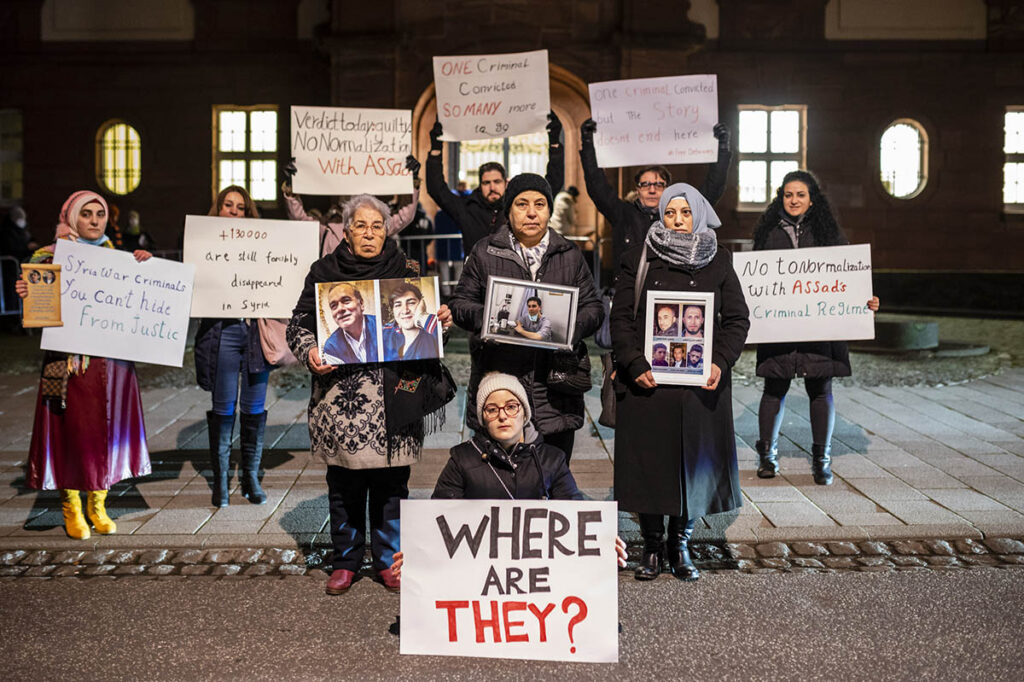
The Syria Campaign supported our partners to travel to Koblenz to be present outside the courtroom for the verdict, carrying photos of their disappeared and detained loved ones and making sure the world did not forget that Anwar Raslan is a member of a wider system – and that there are tens of thousands still missing and forcibly disappeared across Syria. The trial and verdict offered a small glimmer of hope for justice for survivors of detention and families of the forcibly disappeared and arbitrarily detained. But it also highlighted how much further there is to go on the path to more comprehensive justice for the countless victims of war crimes and crimes against humanity in Syria.
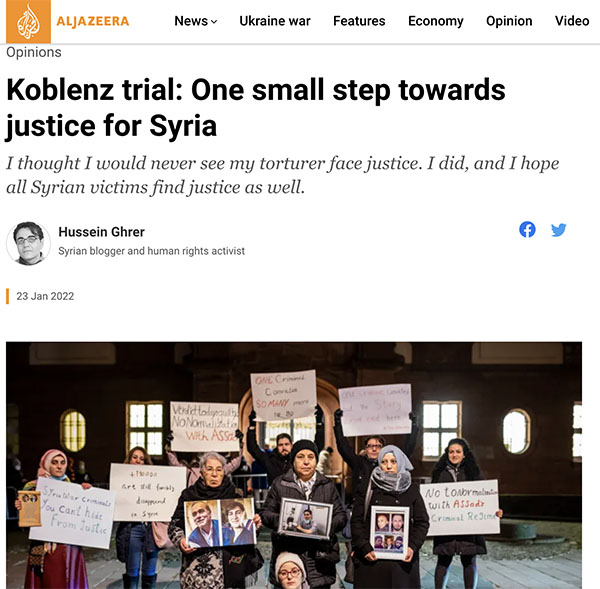
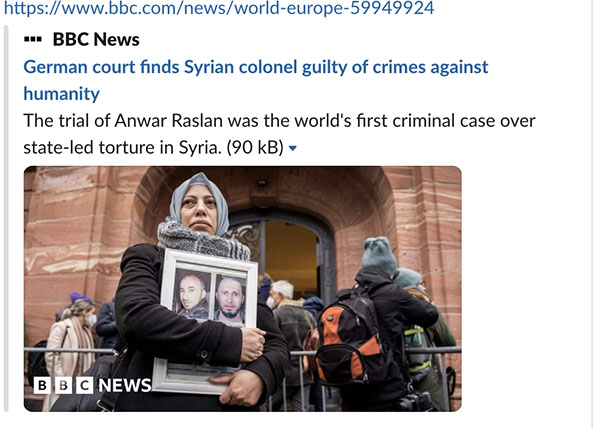
The Koblenz verdict received a huge amount of international media coverage with around 5,000 articles published online in nearly 50 different languages. Based on an analysis of more than 100 of the leading articles we estimate that The Syria Campaign’s partners were featured in around 3,000 online articles.
“As families who lost loved ones in Assad’s prisons, we have been wishing for the day when we could see a member of Syria’s security forces being held accountable for their crimes. We hope that this verdict paves the way for further trials of perpetrators of war crimes against the Syrian people.”
Mariam Hallak, co-founder of Caesar Families Association, whose own son was killed under torture while detained by the Assad regime, reacting to the verdict
“The Syria Campaign recommended that we attend the verdict for the trial of Anwar Raslan and our presence there on the ground was hugely important. The Syria Campaign had reached out to the media and commissioned a professional photographer to be there which really helped us to make a real impact. Huge credit to TSC for the success of this action – our opinions and voices were amplified across the media and all our demands in relation to this conviction were heard. Thank you to The Syria Campaign for all your support,”
Fadwa Mahmoud, co-founder of Families for Freedom
Framing justice at the Oslo Freedom Forum
The guilty verdict for Anwar Raslan at the trial in Koblenz, while a symbolic moment, does not bring full justice to the Syrian people – the struggle for wider, more comprehensive accountability continues with so much more still to be done. In April 2022 The Syria Campaign partnered with the Human Rights Foundation to launch the report “Framing Justice in Syria”. The report, based on interviews with more than a dozen legal experts, human rights campaigners, survivors and family members of people forcibly disappeared in Syria, examines routes to hold perpetrators of grave crimes under international law committed in Syria since 2011 accountable. It also highlights the importance of ensuring the voices of survivors and victims’ families are heard and their needs are at the center of any efforts to achieve justice.
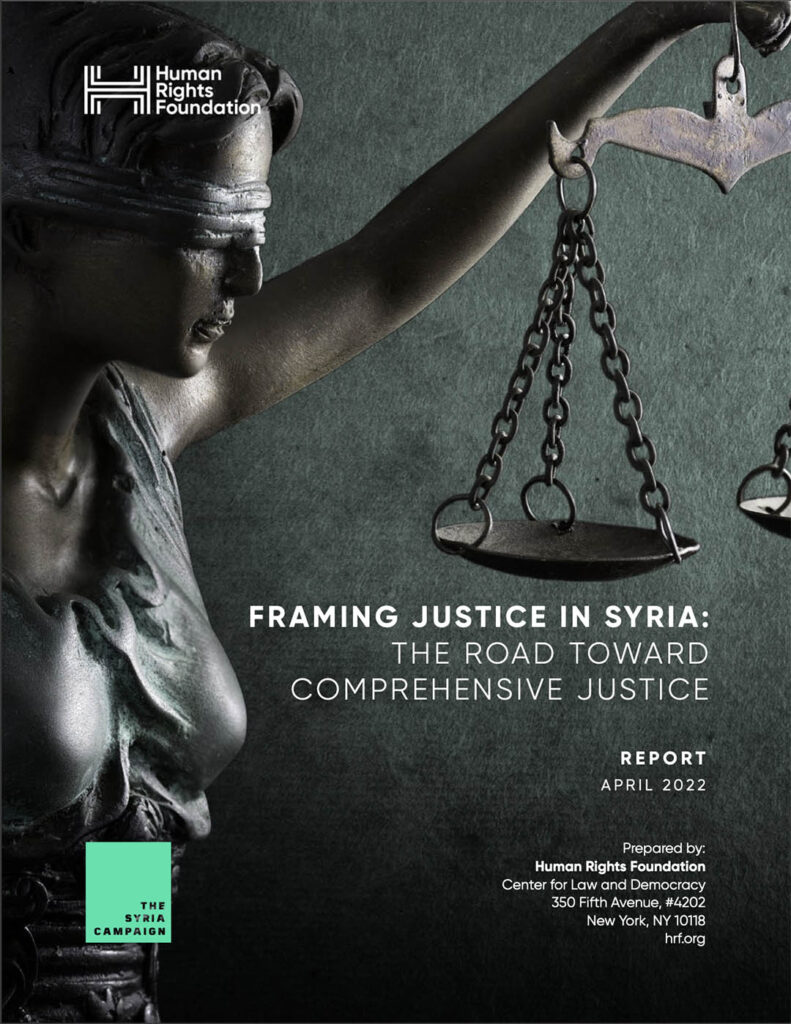
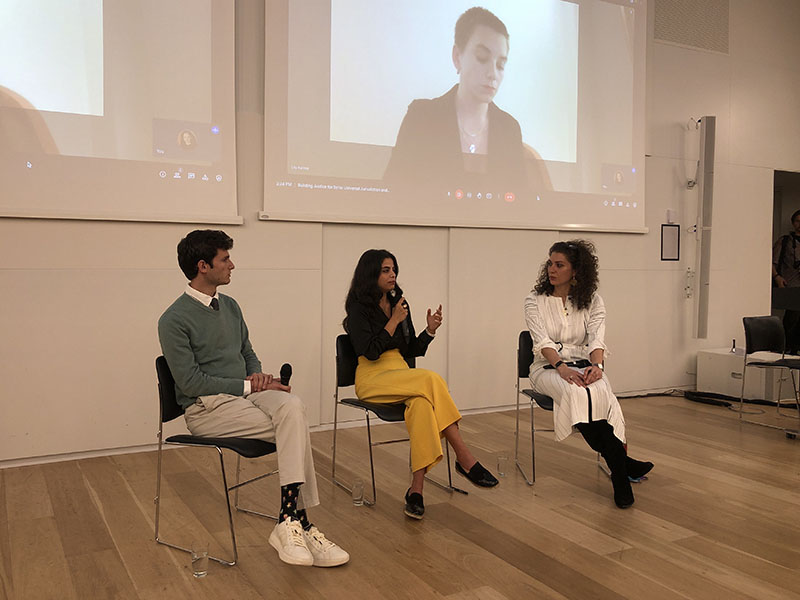
The report’s findings formed the basis of a panel discussion at this year’s Oslo Freedom Forum in May 2022. Former detention survivor Omar al-Shogre, Syrian journalist and activist Wafa Mustafa and legal expert Alexandra Lily Kather discussed the significance and limitations of universal jurisdiction as well as other international justice mechanisms.
‘Walk for Ragheed’ Syria’s longest serving political prisoner
Starting in November 2022, hundreds of our supporters from around the world took part in our #WalkforRagheed campaign to demand the release of Ragheed al Tatari, Syria’s longest serving political prisoner who has spent 41 years detained without ever being charged or facing a proper trial.
In a remarkable demonstration of global solidarity for his little-known case, people from Germany, the USA, Lebanon, Portugal, Japan, the UK and many more countries pledged to walk a total of 12.6 million steps paying tribute to all the steps Ragheed has missed out on taking during his 41 years in prison cells.
The years of silence and neglect from the international community contribute hugely to the pain and suffering felt by families of those arbitrarily detained in Syria with no end in sight. Individuals become anonymous numbers within Assad’s vast arbitrary detention system. Seeing so many people call for Ragheed’s release helped to show that even after more than four decades behind bars he has not been forgotten by the world.
“I want my father to spend what’s left of his life free. I want him to know that he is not forgotten, and that there are people around the world who demand freedom for him and all of Syria’s detainees.”
Waill al-Tatari, Ragheed’s son
“Ragheed’s case means a lot to us as a team and to all Syrian detainees, in particular detainees who encountered him in prison – for us he is a symbol of the brutality and injustice of the Syrian regime. The Walk for Ragheed campaign was incredibly inspiring – The Syria Campaign’s support to devise an innovative campaign, getting members of the public to participate in a small act such as walking to show their support was crucial. We felt it was the perfect way to really illustrate all the years that he has lost from his life while unjustly imprisoned,”
Diab Serrih, co-founder of ADMSP
Our supporters posted on Instagram, Twitter and Facebook, including former CNN reporter, Arwa Damon, who pledged her support to her 27,000 plus followers, and Oscar-nominated filmmaker, Waad Al Kateab from Action for Sama.
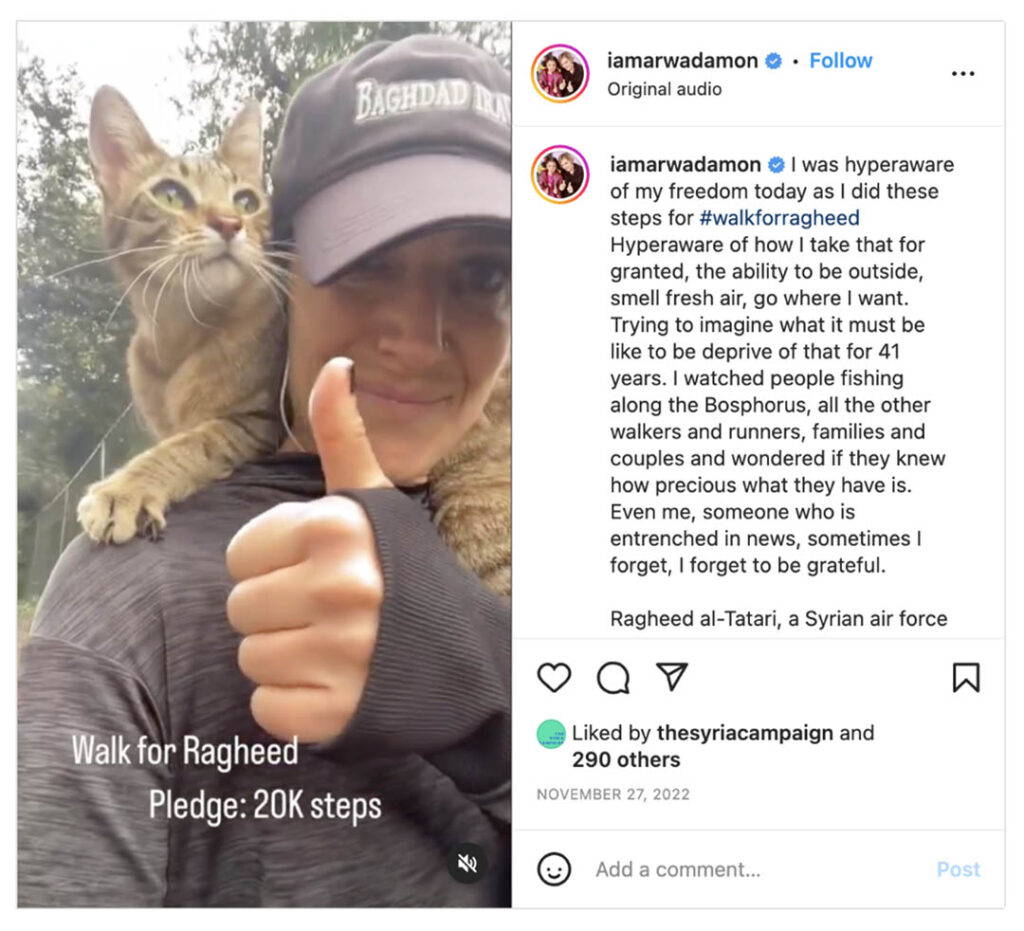
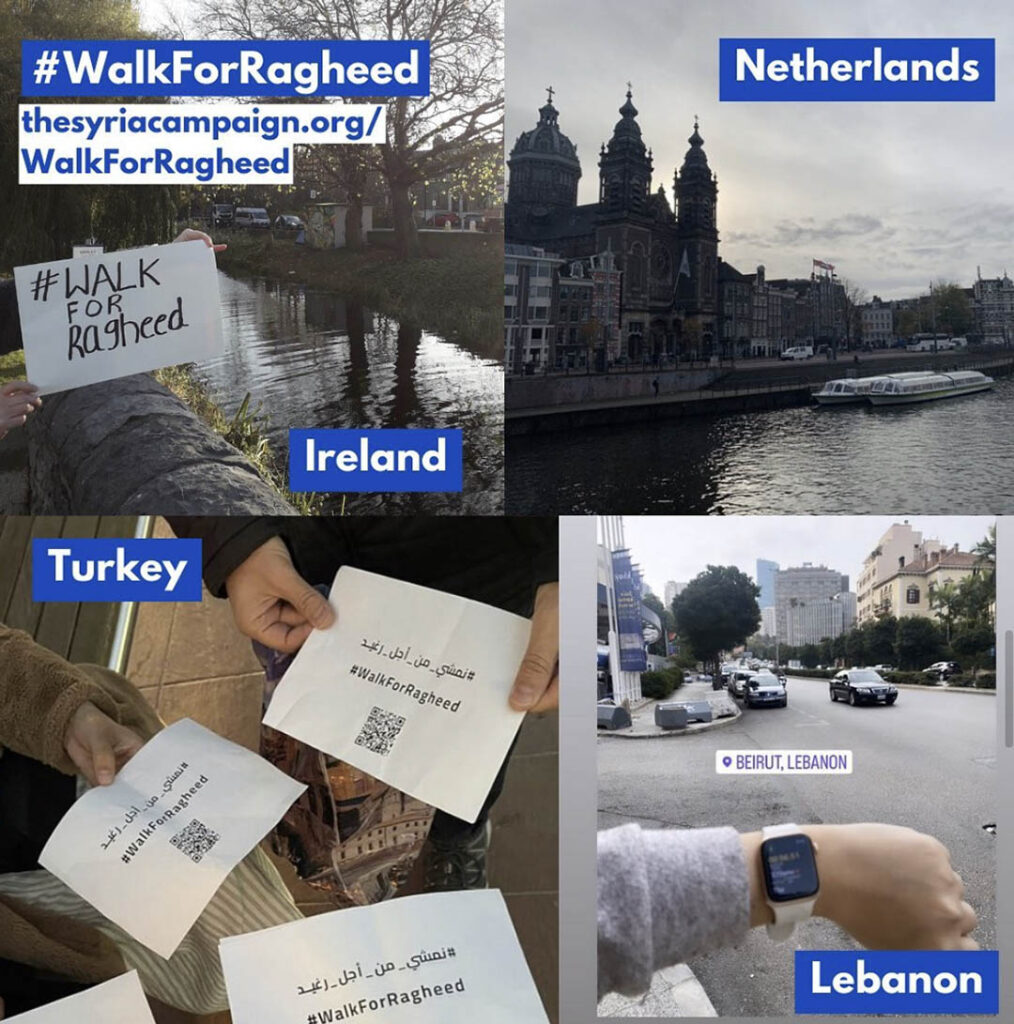
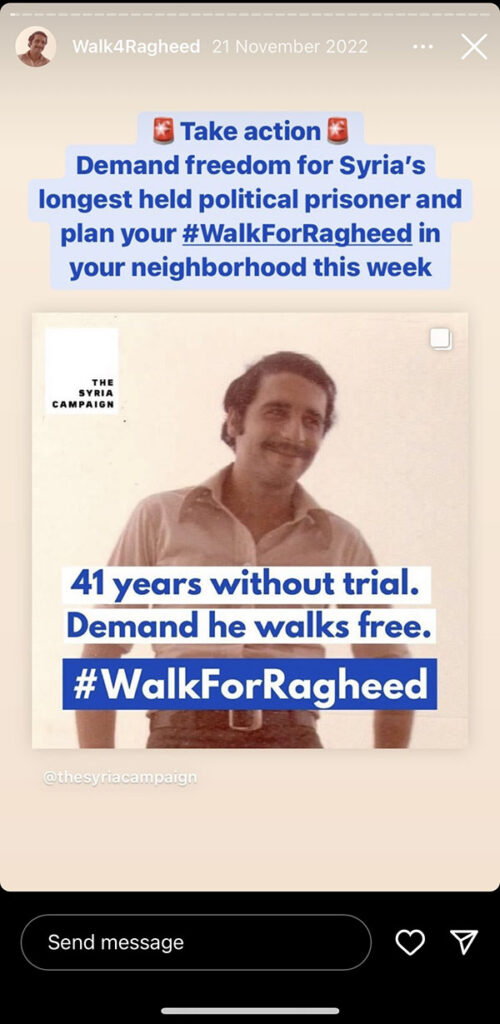
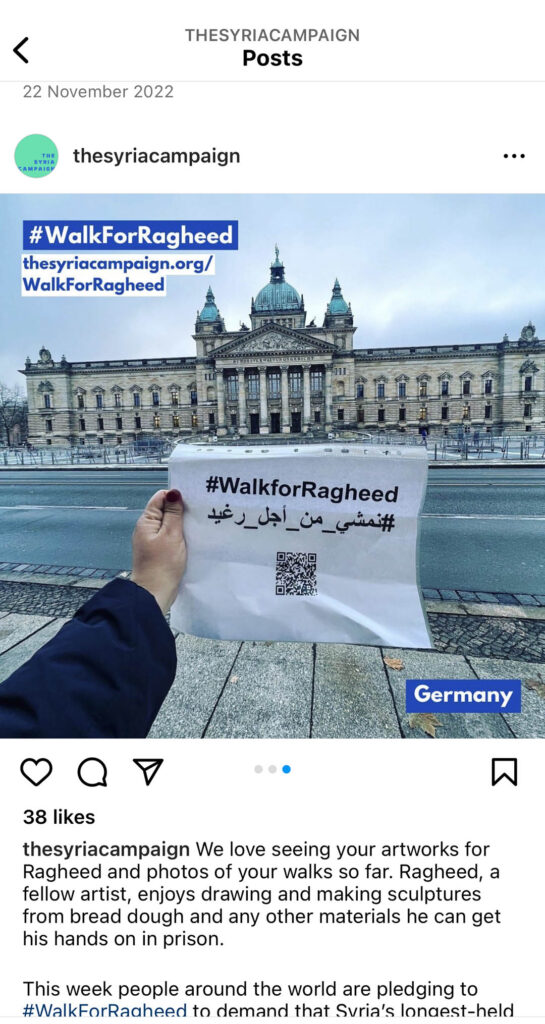
Image: Fadwa Mahmoud addressing the UN Human Rights Council, September 2022
Advocacy with partners
The Syria Campaign played an instrumental role in supporting key advocacy trips for other partners. We took part in and arranged meetings for Action for Sama in New York in June with top officials including UN ambassadors and Syria humanitarian and political staffers focusing on the need to renew cross-border authorization for humanitarian aid to northern Syria ahead of the renewal of the vote in July, as well as demanding accountability for attacks on hospitals and humanitarians. We also edited and pitched an opinion piece by Action for Sama’s co-founder and award winning filmmaker behind For Sama, Waad al-Kateab, to The Wire, an Indian news daily, explaining why India’s support at the UN Security Council was crucial to ensure cross-border deliveries of humanitarian aid continued.
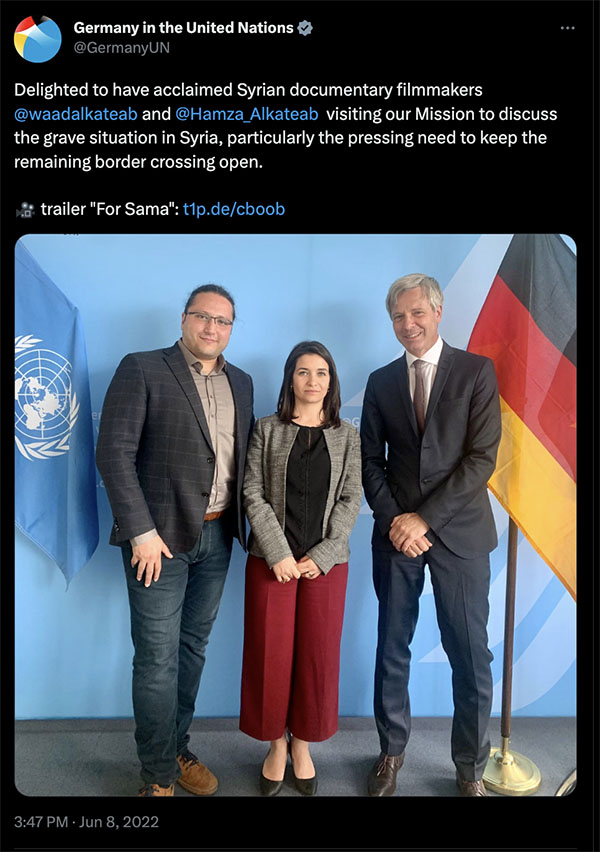

In April 2022, a shocking report published in the Guardian revealed the massacre of 41 people in Tadamon, a neighborhood of Damascus in 2013 by branch 227 of Syria’s military intelligence service. Video evidence of the war crime was released showed two main perpetrators marching a group of blindfolded men and women with their hands bound towards a giant hole. One by one the civilians were shot dead, their bodies buried on top of one another in a mass grave.

In response The Syria Campaign drafted an open letter signed by 17 Syrian humanitarian, human rights, and civil society organizations demanding that the UN Security Council take urgent action to address the Tadamon massacre and hold the perpetrators accountable. We arranged for the letter to be hand delivered to US Ambassador Thomas-Greenfield by the White Helmets. During an advocacy meeting a few months later the Ambassador acknowledged that she had read the letter. We also placed an emotive first person piece by Yasmen Mashaan, of Caesar Families Association describing how the news of the massacre reopened old wounds.
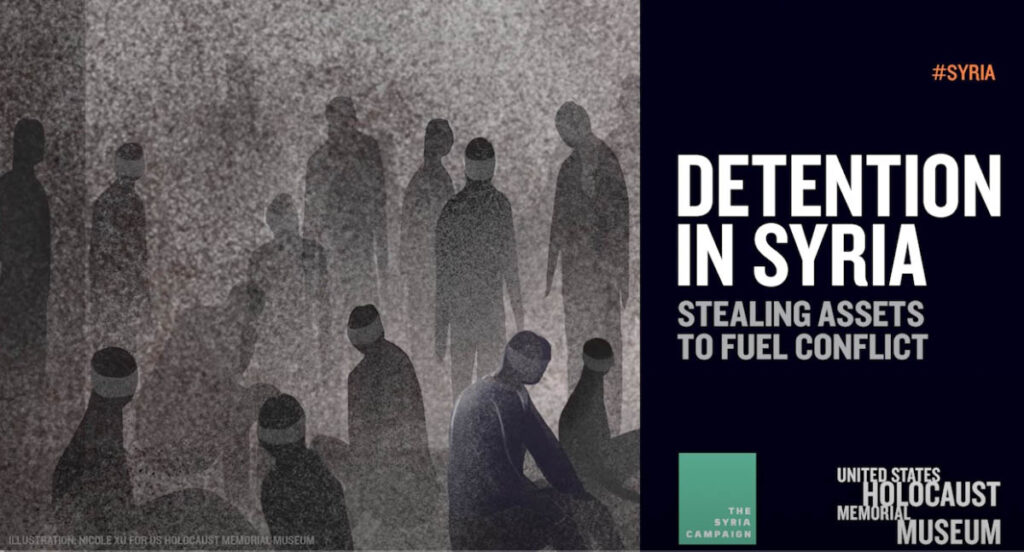
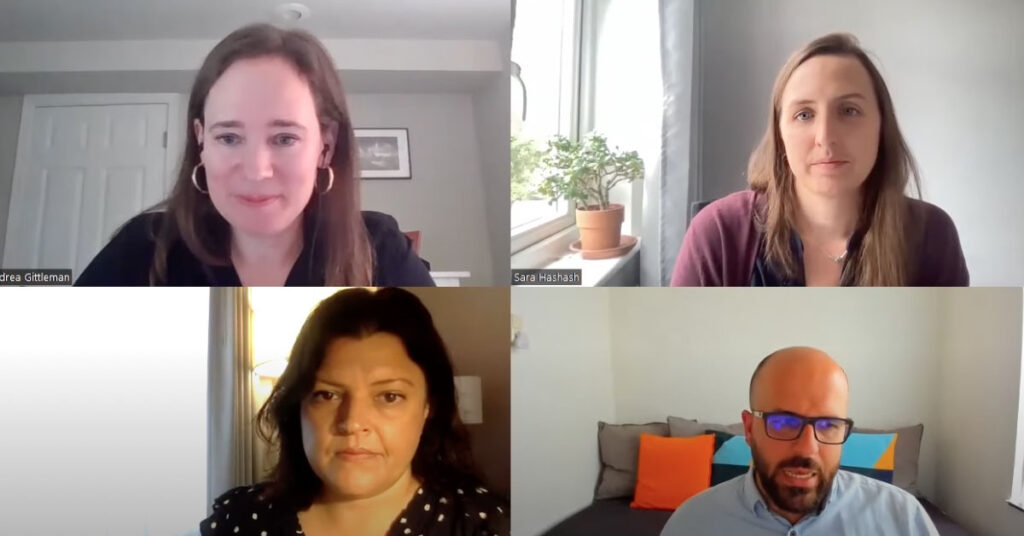
USHMM and The Syria Campaign joint event to discuss findings of ADMSP report on confiscation of detainee assets
“We are so grateful to have the support of The Syria Campaign as funders and key partners over the past year. From advocacy support to creative brainstorms we greatly value their input and look forward to continuing to work together to demand justice and accountability, equitable aid access and protection for Syrian refugees.”
Waad al-Kateab, award-winning filmmaker and co-founder of Action for Sama.
To mark International Women’s Day 2022 we brought together three of our partners Mazaya, The White Helmets and Action for Sama for a webinar entitled “We Are The Women of the Syrian Revolution”. The session, moderated by Waad al-Kateab, was a unique opportunity to hear from women working on the frontlines on the ground in Syria about their daily struggles, their vision and future hopes for Syria. The webinar was watched by more than 38,000 viewers and we received overwhelmingly positive feedback from the audience in a post-event survey.
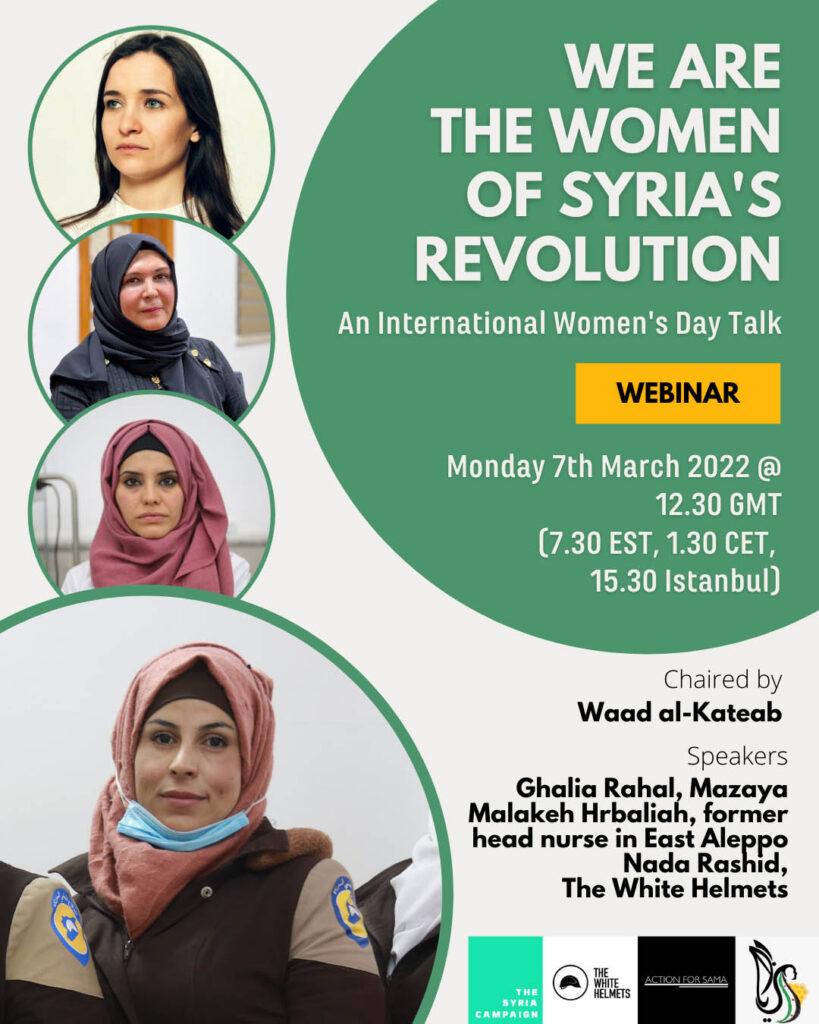
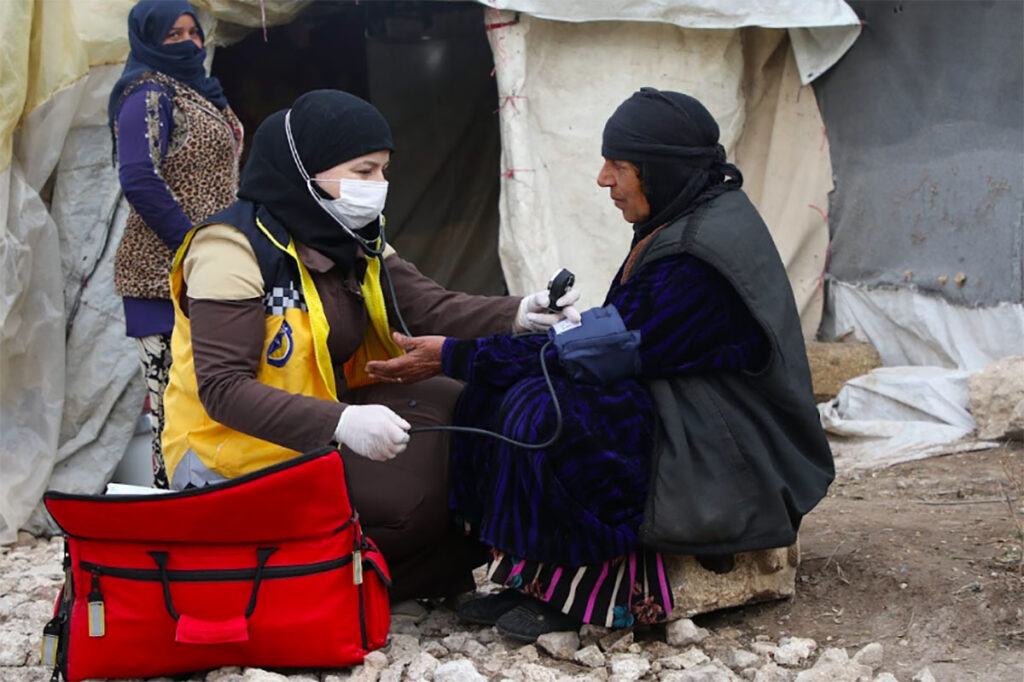
Protect refugees
Rwanda Rapid Response Campaign
On the 14th June 2022, UK Home Secretary Priti Patel announced plans to deport dozens of asylum seekers from the UK to Rwanda. 14 Syrians were among up to 100 people who were notified that they would be sent to Rwanda.
The move was totally unprecedented. The Rwandan government has a record of arbitrary arrests, enforced disappearance and torture – and the Home Office even acknowledges that LGBTQI+ refugees face discrimination in the country.
Seeking asylum is a basic human right, not a crime. Nearly 3,000 of our UK supporters took part in our campaign action by emailing their MPs to demand that the government stop the deportations and reverse this inhumane policy.
Celebrities including the actors Riz Ahmed and James Purefoy, comedian Rachel Parris and The Guilty Feminist podcast are just some of the high-profile supporters who showed their solidarity for our campaign on social media.
Waad al-Kateab, the award winning filmmaker of For Sama, fled Russia’s intense military bombardment of Aleppo in 2016 and sought refuge in the UK. She said:
“Like me and my family, these people were forced out of their own countries. They had no choice about losing their home, identity and loved ones. Their only choice was to do anything they could to survive. Searching for support and hope in the UK, I can’t believe they now face being sent away to another country. How can we allow human beings to be treated this way?”
Waad al-Kateab, the award winning filmmaker
Corruption at the heart of the WHO in Damascus
In October 2022, the Associated Press published a damning account detailing rampant corruption, misappropriation of tax-payer funds, abuse and missing medical items at the UN’s World Health Organization in Damascus.
According to whistleblowers the head of WHO Damascus, Dr Akjemal Magtymova, threw lavish parties violating COVID protocols, bestowed gifts on members of the Syrian regime and hired unqualified relatives of regime officials, including some who are accused of human rights violations.
In response, The Syria Campaign launched an urgent petition, signed by more than 4,800 people to demand UN accountability and reform. This campaign built on our previous work in a 2016 report Taking Sides which exposed how the UN breached its own humanitarian principles of impartiality, independence and neutrality by allowing Assad to dictate where UN aid from Damascus is sent and who the UN is allowed to work with and what it spends its money on.
Reports from international NGOs have uncovered flaws in UN procurement processes and how millions of dollars of UN funds have gone to companies with owners facing US or EU sanctions or involved in horrific atrocities.
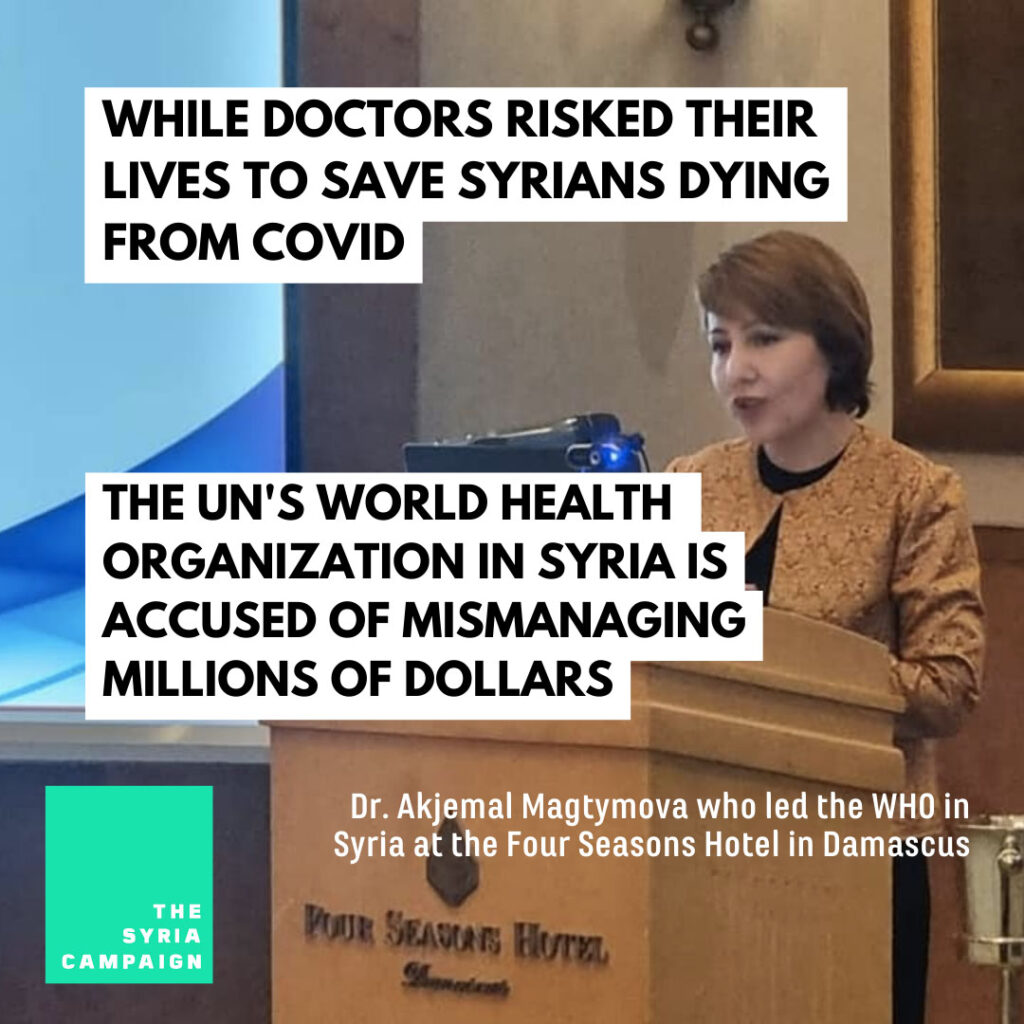
Thank you
We are immensely grateful to the individuals and foundations whose generosity and support make possible every campaign we launch, story we tell, and advocacy meeting we hold.
We thank our board of directors for their guidance and expertise through another year of work.
Our global community of supporters are the beating heart of The Syria Campaign. By continuing to show solidarity with Syrian civilians long after the world’s media and decision makers have turned away, they are building power behind the Syrian people’s demands for rights and justice.
Our deepest gratitude goes to the brave Syrian activists, humanitarians, first responders, doctors, nurses, storytellers, educators, feminists, artists, and every Syrian who continue to strive for freedom and justice for Syria everyday. We are honoured to work alongside them and continue to be guided by their unfailing courage and determination.
Thanks to our donors
2022 donors include: Rockefeller Brothers Fund, Oak Foundation, Global Fund for Women, Women’s International League for Peace and Freedom, Syrian Justice and Accountability Centre, National Endowment for Democracy, Luminate Strategic Initiatives , International Media Service (IMS), Dutch Ministry of Foreign Affairs, FES, Bureau of Democracy, Human Rights, and Labor (DRL) – Heroes on the Frontline
The contents of this annual report are solely the responsibility of The Syria Campaign and do not reflect the views of our partners.
